- Home
- Fannie Flagg
Fried Green Tomatoes at the Whistle Stop Cafe Page 10
Fried Green Tomatoes at the Whistle Stop Cafe Read online
Page 10
Idgie told Stump to stay in the car and she got out and went up to talk with the woman. The dog inside the house was beside itself, jumping up and down, yapping, it was so excited to see her.
Idgie talked for a few minutes, and then the lady went away for a second and came back and handed Idgie a rubber ball. When she opened the screen door, the little dog flew out and was about to wiggle itself to death, so glad to see her.
Idgie walked down off the porch, and said, “Come on, Lady!Come on, girl!” and threw the ball up in the air. The little white rat terrier jumped at least four feet and caught the ball in midair, and then ran back to Idgie and gave it back to her. Then Idgie threw the ball up against the house and Lady jumped straight up and caught it again.
That’s when Stump noticed that the little dog only had three legs.
That dog jumped and ran after that ball for about ten minutes and never once lost its balance. After a while, Idgie took the little dog back up to the house and went inside to say goodbye to the redheaded woman.
Then she came back out to the car and drove down a little road, where she parked by the river.
“Stump, I want to ask you something, son.”
“Yes ma’am.”
“Did that dog look like it was having a good time?”
“Yes ma’am.”
“Did it look like she was happy to be alive?”
“Yes.”
“Did it look to you like she felt sorry for herself?”
“No ma’am.”
“Now, you’re my son and I love you no matter what. You know that, don’t you?”
“Yes ma’am.”
“But you know, Stump, I’d hate like the devil to think that you didn’t have any more sense than that poor, little dumb dog we saw today.”
He looked down at the car floor. “Yes ma’am.”
“So I don’t want to hear any more about what you can and cain’t do, okay?”
“Okay.”
Idgie opened up the glove compartment and pulled out a bottle of Green River Whiskey. “And besides, your Uncle Julian and I are going to take you out next week and teach you how to shoot a real gun.”
“Really?”
“Really!” She removed the bottle cap and took a swallow. “We’re gonna make you the best goddamned shot in the state,and just let one of them try and beat you at anything … here, have a drink.”
Stump’s eyes got big as he reached for the bottle. “Really?”
“Yes, really. But don’t tell your mother. We’ll make those boys wish they hadn’t got up in the morning.”
Stump took a sip and tried to act as if it hadn’t tasted like gasoline on fire and asked, “Who was that woman?”
“A friend of mine.”
“You’ve been here before, haven’t you?”
“Yeah, a couple of times. But don’t tell your mother.”
“Okay.”
DECEMBER 30, 1934
Onzell had told her son Artis over and over again that she did not want him going over to Birmingham, ever; but tonight, he went anyway.
He jumped off the back of the freight that arrived at the L & N terminal station at about eight o’clock. When he went inside, his mouth dropped open.
The station seemed as large, to him, as Whistle Stop and Troutville put together, with its rows and rows of thick, rich mahogany benches and the multicolored tile that covered the floor and the walls of the huge building.
SHOE SHINE … SANDWICH COUNTER … CIGAR STAND … BEAUTY SHOP … MAGAZINES … BARBERSHOP … DONUTS AND CANDY … CIGARETTES … WHISKEY BAR … COFFEE … BOOKSTORE … HAVE YOUR SUITS PRESSED … GIFT SHOP … COLD DRINKS … ICE CREAM …
Here was a city, teeming with redcaps, porters, and train passengers, all under the seventy-five-foot glass ceiling. It was all too much for the seventeen-year-old black boy in overalls who had never been out of Whistle Stop. He thought he had seen the whole world inside that one building, and he staggered out the front door, dazed.
And then he saw it. There it was, the largest electric light sign in the world—twenty stories high, with ten thousand golden light bulbs glowing against the black sky: WELCOME TO BIRMINGHAM … THE MAGIC CITY …
And it was magic; billed as the “fastest growing city in the South,” and even now, Pittsburgh was being called the Birmingham of the North … Birmingham, with its towering skyscrapers and steel mills that lit up the sky with red and purple hues, and its busy streets buzzing with hundreds of automobiles and the streetcars on wires, whisking back and forth, day and night.
Artis walked down the street in a trance, past the St. Clair (Birmingham’s Up-to-the-Minute Hotel), on by the L & N Cafe, and the Terminal Hotel. He peered in between the Venetian blinds on the window of the coffee shop and saw all the white men sitting there, enjoying their blue-plate specials, and knew that this was not the place for him. He made his way past the Red Top Bar and Grill, and over the Rainbow Viaduct, on by the Melba Cafe, and, as if by some primeval instinct, he found 4th Avenue North, where all of a sudden the complexion began to change.
He had found it: Here it was, those twelve square blocks, better known as Slagtown … Birmingham’s own Harlem of the South, the place he had dreamed about.
Couples began moving past him, all dressed up, talking and laughing on their way to somewhere; and he was being pulled along with them, like a whitecap floating on the crest of a wave. Music throbbed out of every door and window and spilled down flights of stairs into the streets. The voice of Bessie Smith wailed from an upstairs window, “Oh, careless love … Oh, careless love …”
Hot jazz and blues were melting together as he passed by the Frolic Theater, which boasted to be the finest colored theater in the South, featuring only musicals and high comedy.
And the people kept on moving.… Down the block, Ethel Waters sang and asked the musical question, “What did I do to be so black and blue?” While next door, Ma Rainey shouted out “Hey, Jailor, tell me what have I done?” … And people in the Silver Moon Blue Note Club were doing the shimmy-sham-shimmy to Art Tatum’s “Red Hot Pepper Stomp.”
He was here—Slagtown on a Saturday night—and just one block away, white Birmingham was completely unaware that this exotic sepia spot even existed. Slagtown, where the Highland Avenue maid of that afternoon could be tonight’s Queen of the Avenue, and red-caps and shoeshine boys were the leaders of Slagtown’s after-dark fashion show. They were all here, with black shiny patent-leather slick hair and gold teeth that glistened and sparkled as they passed under the colored lights that flashed and traveled around the signs. Blacks, tans, cinnamons, octoroons, reds and dukes mixtures, moving Artis down the street, all dressed in suits of lime green and purple, sporting two-toned yellow-and-tan brogans and thin red-and-white silk ties, while the ladies, with gleaming deep maroon and tangerine lips and swinging hips, were promenading in spectator pumps and red fox furs …
Lights blinked away at him. THE MAGIC CITY BILLIARDS PARLOR FOR GENTLEMEN; THE ST. JAMES GRILL; BLUE HEAVEN BAR-B-CUE; ALMA MAE JONES SCHOOL OF BEAUTY CULTURE … on past the Champion Theater, Where Happiness Costs So Little, ¢10 … Two doors down, he saw dancing couples through the window of the Black and Tan Ballroom, where amber spotlights lazily searched the room, turning the couples a pale purple as they floated by. He turned the corner and was carried along, faster and faster, down the teeming street, past The Clouds of Joy Used Clothing Exchange, the Little Delilah Cafe, Pandora Billiards, and the Stairway to the Stars Cocktail Lounge, advertised as The Home of the Mixed Drink, and the Pastime Theater, this week featuring Edna Mae Harris in an All-Colored Revue. Next door, at the Grand Theater, Mary Marble and Little Chips were appearing. He went on by the Little Savoy Cafe, past more dancing couples, silhouetted through the windows of the Hotel Dixie Carlton Ballroom, with its large revolving mirrored ball shooting silver sparkles of light all over the room.… Foxtrotting couples inside were unaware of the young black boy in overalls, wide-eyed with wonder, being swept by the Busy
Bee Bar-b-cue Shop, for Ladies and Gents that offered Electrically Cooked Waffles and Hot Cakes at All Hours and Your Favorite Sandwiches Toasted, Served with the Best Coffee in the City, Hot Dogs for ¢5, Homemade Chili, Hamburger, Pork, Ham, Swiss Cheese Sandwiches, All for a Dime … past the Viola Crumbely Over the Rainbow Insurance Co., which specialized in burial policies, with a sign in the window that urged her potential customers to Get a Lot While You’re Young, on by the De Luxe Hotel and Rooms for Gentlemen.
Near the Casino Club at the Masonic Temple, a large-breasted beauty behind him, resplendent in a corn-colored satin dress, wearing a lemon-yellow feather boa, squealed and swung her purse at a fleet-footed gentleman and missed. The gentleman laughed, and Artis laughed, too, as he continued on down the street with the crowd; he knew he was home at last.
MAY 6, 1937
Mr. Artis O. Peavey was admitted to the University Hospital late Saturday evening, suffering from multiple self-inflicted accidental injuries he received while attempting to open a particularly expensive bottle of wine, his female companion said; the year and the label unknown.
Is it just my imagination, or did I see Miss Ida Doizer on the midnight streetcar the other night headed out to Ensley to Tuxedo Junction for a few dances with Bennie Upshaw, only to see her ride home with Mr. G. T. Williams?
We must have two or three Birmingham boys in every one of the popular bands around the country, thanks to the expert musicianship of our own beloved Professor Fess Watley. We are well received on the music scene. Don’t forget our old friend Cab Calloway is due to grace our magic city soon.
Fine fare over at the Frolic Theater this week …
Monday–Thursday: A 5-Star Program Erskine Hawkins, “The Twentieth Century Gabriel,” in
“DEVILLED HAMS”
ALSO—ALL COLORED SPORTS REEL
MARCH 2, 1986
Eating a cup of vanilla ice cream with a wooden spoon, Mrs. Threadgoode was reminiscing to Evelyn about the Depression …
“A lot of people died, one way or the other. It hit hard. Especially the colored, who never did have much to begin with. Sipsey said that half the people over there in Troutville would have froze or starved to death if it hadn’t been for Railroad Bill.”
This was a new name to Evelyn. “Who was Railroad Bill?”
Mrs. Threadgoode seemed surprised, “Didn’t I ever tell you about Railroad Bill?”
“No, I don’t believe you have.”
“Well, he was a famous bandit. They say he was a colored man that would sneak on the trains and throw food and coal off the government supply trains at night, and the colored people that lived along the tracks would come and get the stuff at daybreak and run home with it as fast as they could.
“I don’t believe they ever did catch him … never did find out who he was … Grady Kilgore, who was a railroad detective friend of Idgie’s, used to come in the cafe every day, and Idgie would laugh and say, ‘I hear ol’ Railroad Bill is still on the loose. What’s the matter with you boys?’ He used to get so mad, they must have put twenty extra men on the trains, at one time or another, and they offered a lifetime pass on the L & N Railroad to whoever had information about him to come forth, but nobody did. Idgie just razzed him to death over that one! But they were always good friends. He was in that Dill Pickle Club …”
“That what?”
Mrs. Threadgoode laughed. “The Dill Pickle Club, this crazy club Idgie and Grady and Jack Butts started.”
“What kind of a club was it?”
“Well, they claimed it was a breakfast and social club, but it was really just a bunch of Idgie’s ragtag friends that would all get together, she and some of the railroad men and Eva Bates and Smokey Lonesome. About all they did was drink whiskey and make up lies. They’d look you right in the eye and tell you a lie when the truth would have served them better.
“That was their fun, making up tales. Crazy tales. One time, Ruth had just come in from church and Idgie was sitting around with them and she said, ‘Ruth, I’m sorry to have to tell this, but while you were gone, Stump swallowed a 22-caliber bullet.’
“When Ruth got all excited, Idgie said, ‘Don’t worry, he’s just fine. I just took him over to Doc Hadley’s and he gave him a half a bottle of castor oil, and said it was all right to bring him home but just be careful not to point him at anyone.’ ”
Evelyn laughed. Mrs. Threadgoode said, “Well, you can imagine that Ruth didn’t care much for the idea of that club. Idgie was the president and she was always calling secret meetings. Cleo said those secret meetings were nothing more than hot polker games. But he said the club did some good things, but they would never tell you about it if they did, they’d deny it every time.
“They didn’t care anything about the Baptist preacher, Reverend Scroggins, ’cause he was a teetotaler, and every time some poor fool would ask where he could buy whiskey or live bait, they’d sent him over to the preacher’s house. Like to have driven him crazy.
“Sipsey was the only colored member, because she could tell lies right along with the rest of them. She told them about this woman she was helping who has having trouble giving birth, and how she gave her a tablespoon of snuff and she said that woman sneezed so hard that she shot that baby clear across the end of the bed and into the other room …”
Evelyn said, “Oh no!”
“Oh yes! Then she told them this tale about her friend Lizzy, over in Troutville, that was expecting a baby and started craving starch. Said that Lizzy took to eating it right out of the box by the handfuls, and sure enough, when that baby came, it was white as snow and stiff as a board …”
“Oh for heaven’s sake.”
“But you know, Evelyn, that could have been true. I know for a fact some of those colored women ate clay right out of the ground.”
“I can’t believe that.”
“Well, honey, that’s what I heard. Or maybe it was sticks of chalk. I forget which one. But it was either clay or chalk.”
Evelyn shook her head, smiling at her friend. “Oh Mrs. Threadgoode, you are funny.”
Mrs. Threadgoode thought about it and was pleased with herself and said, “Well, yes. I guess I am at that.”
DECEMBER 1, 1938
Snow Comes to Whistle Stop
What a treat for us, real snow. Whistle Stop could have passed for the North Pole last week. Is there anything prettier than seeing the red holly bushes covered with snow? I think not, but thank heavens it only snows once every ten years. My other half, who thinks he can drive in any sort of weather, was determined to take his old hunting dogs for a ride and skidded into a ditch on 1st Street. So the little lady you see bumming a ride for the next month, until we can get the car fixed, will be me.
Yes, my other half is the same one who went for a ride when we had that hailstorm with hail as big as baseballs and it took us three weeks to get the windshield replaced. He’s the same one that got struck by lightning, fishing down on the river in a rowboat. So the next time you see bad weather coming and you see Wilbur, send him home and I’m gonna put him in the closet and lock him up. I’m afraid a tornado is liable to pick him up and take him on off somewhere … then who would I have to fight with?
I hear through the grapevine that Railroad Bill has hit five trains in one week. I ran into Gladys Kilgore over at the beauty shop, and she says that her husband, Grady, who works for the railroad, is hopping mad.
By the way, if Railroad Bill reads this, how about throwing a brand-new car off one of those trains before Grady catches you … I need one!
… Dot Weems …
DECEMBER 1, 1938
The sun had just come up behind the cafe, and Idgie shook him awake, shouting, “Get up, Stump! Get up! Look!” She pulled him to the window to look out.
The entire field was covered with white.
His mouth flew open. “What is it?”
Idgie laughed. “It’s snow.”
“It is?”
“Yes.”
He
was in the third grade and this was the first time in his life he had ever seen real snow.
Ruth came up behind them in her nightgown and looked out, just as surprised.
All three of them got dressed as fast as they could and were out in the yard five minutes later. It was only two inches deep, but they rolled in it and made snowballs. You could hear the doors opening all over town and children shouting with excitement. By seven o’clock that morning, Stump and Idgie had already built a short, fat snowman and Ruth made them snow ice cream with milk and sugar.
Idgie decided to walk Stump to school, and as they looked up the railroad tracks, there was nothing but white for as far as they could see. Stump was still so excited, he was jumping around and fell twice. Idgie decided to tell him a story to calm him down.
“Did I ever tell you the time me and Smokey played polker with Pig Iron Sam?”
“No. Who’s Pig Iron Sam?”
“You mean to tell me you never heard of Pig Iron, the meanest polker player in Alabama?”
“No ma’am.”
“Well, me and Smokey was sitting in this all-night polker game over in Gate City, and I started winning. I guess I won every pot for an hour or so, and Pig Iron was getting madder and madder, but what could I do? I couldn’t quit, not while I was winning like that … that’s not etiquette. And the more I won, the madder he got, and pretty soon he was in a rage and pulled this gun out and put it on the table and said that he was going to kill the next man that dealt him a bad hand.”
Stump was totally engrossed by this time. “Whose turn was it to deal?”
“Well, that’s the irony of it. He forgot it was his turn, and lo and behold, he dealt his own self a pair of two’s. So he just picked up the gun and shot himself to death, right there at the table … a man of his word to the end.”

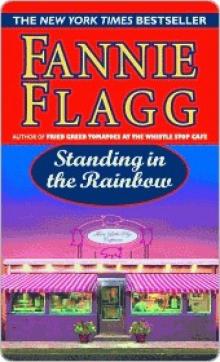 Standing in the Rainbow
Standing in the Rainbow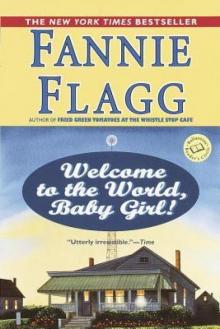 Welcome to the World, Baby Girl!
Welcome to the World, Baby Girl!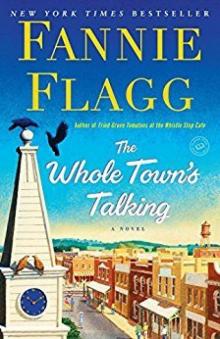 The Whole Town's Talking
The Whole Town's Talking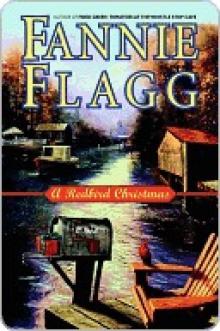 A Redbird Christmas
A Redbird Christmas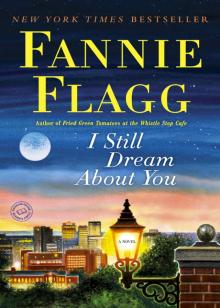 I Still Dream About You
I Still Dream About You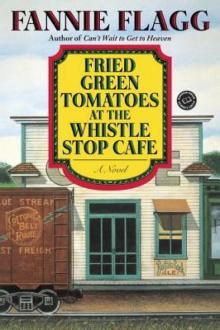 Fried Green Tomatoes at the Whistle Stop Cafe
Fried Green Tomatoes at the Whistle Stop Cafe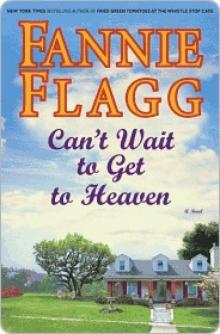 Can't Wait to Get to Heaven
Can't Wait to Get to Heaven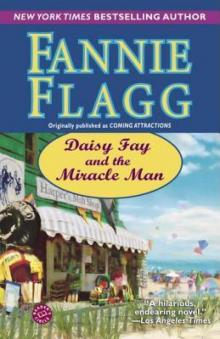 Daisy Fay and the Miracle Man
Daisy Fay and the Miracle Man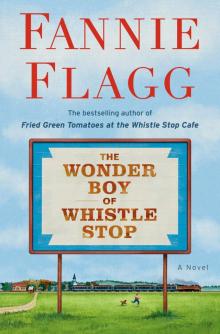 The Wonder Boy of Whistle Stop
The Wonder Boy of Whistle Stop The All-Girl Filling Station's Last Reunion
The All-Girl Filling Station's Last Reunion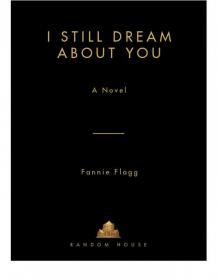 I Still Dream About You: A Novel
I Still Dream About You: A Novel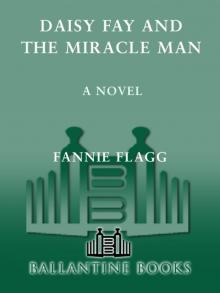 Daisy Fay and the Miracle Man: A Novel
Daisy Fay and the Miracle Man: A Novel